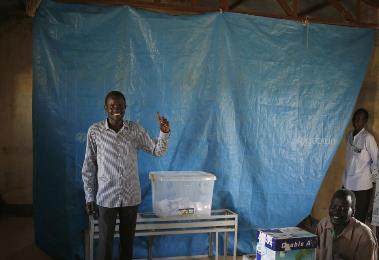South Sudan government proposes referendum to determine number of states
February 21, 2016 (JUBA) – South Sudanese government has come out with a proposal seeking to conduct a referendum to determine the number of states through which the country should be governed in a move which is not provided for in the peace agreement it signed with opposition factions in August last year.

The government official spokesperson was reacting to a criticism at the Sunday occasion by the secretary general of the communist party in South Sudan, who questioned the basis of the creation of 28 states.
Ismail Suleiman, secretary general of communist party challenged the government, saying there was no criteria by the government to create more states and that it should be revoked and return the country to be governed through 10 states which are constitutionally recognized by the agreement and 2011 transitional constitution.
“If you look at how this issue of 28 states came out, you see that nothing was followed. There were no criteria used. Some people just decided to go to the president and told him to create more states and he did it because these are the people who are close to him,” said Suleiman.
“But that is not how the country should be run. He is not the president of individuals. He is the president of the whole country and when there is something to be done for the country, the whole nation should be consulted so that the views of the people are heard because this is about their affairs. It is not about individuals,” he further charged.
In an attempt to defend the decision of the president, minister Lueth claimed the decision was made because it was a popular desire and the government was now ready to allow the people to decide on the number of states they wanted.
The minister claimed that the government led by President Salva Kiir and armed opposition of SPLM-IO led by Riek Machar were on the same page on creation of more states but differed on the number of states to be created.
“We have to be very clear. The SPLM-IO had not dropped its proposed [of] 21 states as it is claimed by others. When the SPLM-IO members of the advance team came to Juba, they sent the list of 21 members going to 21 states. If the SPLM-IO talks of 21 states and the government created 28 states, then all of us have agreed on the creation of states,” Lueth explained.
“We only differ on the number but opened for increment and this can be done through participation of the people. There will need to be a referendum so that the people themselves decide at the referendum the number of states they want,” he said.
Lueth added that if they decide to increase the number or reduce then that will be decided by the outcome of the referendum,” said Lueth.
He said he believes the people will demand more states instead of reduction.
During the peace negotiations in Addis Ababa, SPLM-IO proposed creation of 21 states based on 21 old colonial districts with their historical boundaries. The government however refused creation of more states, saying it was not time to create more states or to establish federal system of governance.
However, 39 days after signing the August 2015 peace agreement based on the 10 states, the government unilaterally decreed creation of 28 states. The decision attracted condemnation from opposition and international community which called for the government to suspend their operationalization until a boundary commission agrees on the number of states and their boundaries.
According to a communiqué released by IGAD, which mediated the peace agreement, if the parties will not agree on the number of states, they will revert to the 10 states.
However, there is no provision for a referendum in the peace agreement.
(ST)
